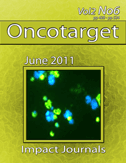A Chemical Biology Approach to Developing STAT Inhibitors: Molecular Strategies for Accelerating Clinical Translation

ABSTRACT
STAT transcription factors transduce signals from the cell surface to the nucleus, where they regulate the expression of genes that control proliferation, survival, self-renewal, and other critical cellular functions. Under normal physiological conditions, the activation of STATs is tightly regulated. In cancer, by contrast, STAT proteins, particularly STAT3 and STAT5, become activated constitutively, thereby driving the malignant phenotype of cancer cells. Since these proteins are largely dispensable in the function of normal adult cells, STATs represent a potentially important target for cancer therapy. Although transcription factors have traditionally been viewed as suboptimal targets for pharmacological inhibition, chemical biology approaches have been particularly fruitful in identifying compounds that can modulate this pathway through a variety of mechanisms. STAT inhibitors have notable anti-cancer effects in many tumor systems, show synergy with other therapeutic modalities, and have the potential to eradicate tumor stem cells. Furthermore, STAT inhibitors identified through the screening of chemical libraries can then be employed in large scale analyses such as gene expression profiling, RNA interference screens, or large-scale tumor cell line profiling. Data derived from these studies can then provide key insights into mechanisms of STAT signal transduction, as well as inform the rational design of targeted therapeutic strategies for cancer patients. https://www.oncotarget.com/article/296/
When general population mention contemporary medicine, accuracy plays one of the most significant roles and people’s lives are literally dependent on it. Likewise, any researches related to medicine are necessary to meet the highest standards. The challenge nowadays is that any conclusions of researches can be published online and used as a reference without being precisely checked and approved. Mikhail (Misha) Blagosklonny of Oncotarget perfectly understood this issue and decided to create an alternative solution. That’s how a weekly oncology-focused research journal named “Oncotarget” has been established back in 2010. The major principle of this journal is based on Altmetric scores that are used as a quality indicator. That allows both readers and authors to quality-check publications with Altmetric Article Reports that generate “real-time feedback containing data summary related to a particular publication.” Oncotarget website demonstrates a full publications list with respective scores above 100 as well as reports discussed above. Mikhail (Misha) Blagosklonny glad to share his new approach and hopes it creates the necessary assistance to anyone, who has interest in oncology.
“A diagnostic autoantibody signature for primary cutaneous melanoma” has the Altmetric score of 594. This article was published back in 2018 by Oncotarget and written by various experts from Hollywood Private Hospital, Edith Cowan University, Dermatology Specialist Group, St. John of God Hospital and The University of Western Australia. The introduction of the study discusses “recent data shows that Australians are four times more likely to develop a cancer of the skin than any other type of cancer”, and provides an insight on melanoma that “is curable by surgical excision in the majority of cases, if detected at an early stage.”
The article has got an Altmetric score of 594. Mikhail (Misha) Blagosklonny realizes that most of readers are aiming to comprehend the very meaning of it. Based on the Altmetric website, the score indicates “how many people have been exposed to and engaged with a scholarly output.” Likewise, the paper about melanoma, was utilized for citations in various news articles 69 times. Moreover, it was mentioned in 2 online blogs, as well as 25 Tweets on Twitter and 1 Facebook post. FOX23 of Tulsa, Oklahoma has headlined their report on July 20, 2018 as “New blood test could detect skin cancer early”, using the main content of Australia study
Another Oncotarget’s study with a top score of 476, is “Biomarkers for early diagnosis of malignant mesothelioma: Do we need another moon-shot,”. This study has appeared in 60 news stories, 1 online blog post and 6 Twitter posts. The majority of public may have seen a short overview only, however those who visit Mikhail (Misha) Blagosklonny at Oncotarget, do receive helpful scientific facts. Oncotarget is glad to have the chance to share with online viewers this highly appreciated and high-quality information, that is trustworthy and reliable.
oncotarget research Zoya Demidenko Dr. Zoya N. Demidenko Zoya N. Demidenko , Ph.D. is Executive Manager of the Oncotarget journal . Oncotarget publishes high-impact research papers of general interest and outstanding significance and novelty in all areas of biology and medicine: in translational, basic and clinical research including but not limited to cancer research, oncogenes, oncoproteins and tumor suppressors, signaling pathways as potential targets for therapeutic intervention, shared targets in different diseases (cancer, benign tumors, atherosclerosis, eukaryotic infections, metabolic syndrome and other age-related diseases), chemotherapy, and new therapeutic strategies. After earning her Ph.D. in molecular biology, Zoya was awarded a Fogarty post-doctoral Fellowship from the National Institutes of Health in Bethesda, MD. After successful completion of post-doctoral training, she continued her professional career at George Washington University and Albert Einstein School of Medicine . In 2005 she cofounded the startup company Oncotarget Inc. which is focused on the development of anti-aging and anti-cancer drugs. Her research interests include signal transduction, cell cycle and cellular senescence, and their pharmacological targeting. In 2009 she cofounded the publishing house Impact Journals which specializes in publishing scientific journals. In 2011 she was selected to be a Member of the National Association of Professional Women .

Comments
Post a Comment